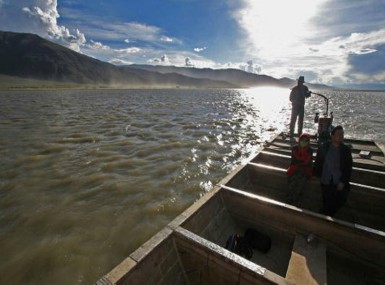Conservationists, experts and communities in Assam opine that the River Basin Management Bill, 2018 for the regulation and development of India’s inter-state rivers and its basins would snatch away states’ right on water and thus would violate the federal structure of the country. The bill is likely to be passed in the upcoming Winter Session of Parliament. [caption id=“attachment_4241055” align=“alignleft” width=“385”]  River Brahmaputra. Image courtesy News18[/caption] The bill, draft of which has been out, seeks to establish 13 River Basin Authorities (RBAs) for each of the 13 rivers which flow through more than one state. The bill says the RBAs would be responsible for preparing master plans for the development, regulation and management of water of an interstate river. However, it does not talk about the status of the existing river boards after the bill becomes an act. Partha Jyoti Das, water and climate expert from Aranyak, a society for biodiversity conservation and an advocacy think tank says, “As per the bill, the chairman of the Executive Board of the River Basin Authorities will be among the officials of the rank of additional secretary from the Central Water Commission. Thus, the bill has a tendency to snatch power from the state government and give it to the Centre.” He further says, “The RBA’s main function would be preparing a master plan for the river basin management which was earlier done by Brahmaputra Board in Assam. The bill does not talk about the future of such boards as well as the state water resource departments.” Two of the rivers of North East—Brahmaputra and Barak—are going to be included in the bill. However, experts feel that uniform laws cannot be applied while addressing water issues in North East when most parts of the river Brahmaputra is in China and there is always a risk of conflict in the international level rather than state level. Environmentalists are also raising concern over the fact that the bill does not address the downstream impact of the rivers. “Downstream impact of the river Brahmaputra in places like Arunachal Pradesh and Assam’s Dhemaji and Lakhimpur are huge due to activities in its upstream areas in Tibet region of China. But the bill is silent on the issue,” Das says. The 2,000 MW Lower Subansiri dam in Arunachal Pradesh, built on Subansiri, an inter-state tributary of Brahmaputra has been halted several times in the past three years due to severe protest by organisations in Assam. Likewise, dams built in the Tibetan Plateau of China threaten to reduce river flows into downstream Arunachal Pradesh and Assam. Rakesh Sharma, deputy chief engineer, Department of Water Resource, Assam says, “It should be especially mandated to the RBAs to ensure that downstream states do not suffer from the unwanted adverse impact of a river dam and other similar structures located in the upstream. In cases where such impact cannot be avoided, efforts should be mandated to minimise the same on terms agreeable to all concerned states." Inter-state rivers in North East India have several dams constructed on it and some are on the process of getting clearance. River experts fear that the policies regarding the basin approach, equitable and sustainable use of water and balance of benefits between states, upstream-downstream cooperation might go against the dam policies.
Conservationists have urged the Centre that those river dam projects seeking clearance, should be halted till the River Basin Authorities (RBAs) are set up.
“There should be a fresh process of seeking clearance of dam building as otherwise dam building process and river basin master plan will be conflicting to each other,” says Ajit Patowary, an environmentalist and a senior scribe from the region. Patowary also stresses water assessment in the interstate rivers is required in the next 50 years in the northeastern region. “In North East India, a huge amount of water is needed for implementation of projects under Look East Policy and if there was no assessment of water needed, there will be a general misconception of having surplus water. The administration then might try to divert excess water from North East India to other parts of the state,” he said. The River Basin Management Bill 2018 is also drawing flakes for not mentioning the impact of climate change on a river. “Without account for climate change, it’s not possible to prepare for future plan of any water resources. Though the bill talks about social and cultural flow but excludes environmental flow. Assessment and maintenance of environmental flow should be mentioned explicitly to avoid any confusion in further process of policymaking,” says Patowary. Wilfred Topno, president of People’s Action for Development (PAD), an NGO working towards the development, rehabilitation of riverbank communities of flood-prone areas of the state is of the view that regarding the decisions making upon a river, the River Basin Authorities must consider community participation and use their traditional knowledge. However, Chandan Mahanta, of Indian Institute of Technology, Guwahati says that the way the government interprets and implement the bill would influence the mandate of the people on the bill. “For a river basin as big as the Brahmaputra there has to be a generic holistic kind of policy-level document where the things will be fine tunes and provide a good framework for doing justice to the entire water resource,” says Mahanta. The River Basin Management Bill, 2018, if passed is going to amend the River Boards Act, 1956.


)

)
)
)
)
)
)
)
)



